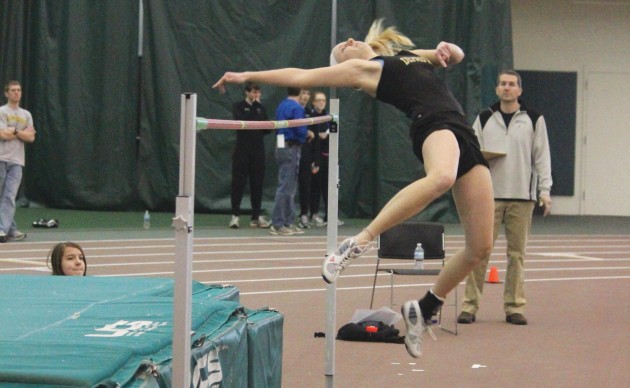
Decathletes have 10 good reasons why their event is toughest in track and field. And while heptathlete's only have seven, their event is no picnic, either.
"I usually do three or four events," junior Lee Harmon explains. "So as soon as it hits like the third event, I'm fine, but you just get tired."
Harmon is one of two athletes from the women's DePauw track and field team that will travel to Ohio Wesleyan University this weekend to compete in the North Coast Athletic Conference Combined Events portion of the conference championship. Harmon and fellow junior Taryn Owens will both compete in the heptathlon.
The history of the decathlon and heptathlon date back to the original Olympics games in Greece. Back then, it was just a pentathlon - long jump, discus throw, javelin throw, sprint and a wrestling match.
Sprint means a variety of things now and the wrestling match is gone, but since the first decathlon was held at the Olympic games in 1904, the event has spread from the Olympics to the collegiate level and turned into the heptathlon for female athletes.
Freshman Jack Leibovitz is the only male from the DePauw men's team making the trip to Delaware, Ohio. This season has been his first experience with the decathlon.
"My high school coach made a joke that I am doing so many that I might as well do the decathlon," Leibovitz said. "And said 'why not?"
The event for the men and women really is a weekend ordeal. It is split five and five for the guys and four and three for the girls. Scoring is interesting because it is really not based on place. The time, height and throw is what is the most important to earn points from each event.
After an event like long jump, the competitors distance - entered in centimeters - is used in an equation with set parameters that vary for each event. Those produce a number that goes towards a value. That value is the competitors score. The place is the event literally does not matter.
"That's what I liked about it," Leibovitz explained. "It's all about the points...It doesn't really matter what other people do. It's what you have to do to win."
This is Harmon's first season competing in the heptathlon. In the past, injuries have slowed her down, but after talking with coaches, she finally has a chance to compete. In a regular event, she might compete in the high jump, hurdles, triple jump or long jump - so she does have some experience in what she is competing in, but there still has been a learning curve.
"It's different," Harmon said. "I had to learn how to throw the shot and the javelin, and that's always an experience."
But still, Harmon prefers it to a regular track meet. She thinks her skill set gives her a better chance during the heptathlon.
"I am decent at my other event," Harmon said, "but what makes somebody good heptathlete is being at a large number of events. So I'm not exceptional at a single event, so by doing this it goes way more in my favor because I can get across the board and it will add up."
Self deprecating comment aside, Harmon is a good heptathlete. She finished in fourth at this year's NCAC Indoor Pentathlon. Owens finished eighth, but it was Leibovitz who had the best spot out of all them finishing in second at the Indoor Heptathlon, losing by just 11 points to Ohio Wesleyan's Andrew Diehl.
Diehl also prefers the decathlon, but, surprisingly, because it gives him a chance to rest. Competitors get a half hour between each event to grab some water, get some food in their system and warm up before the next event.
However, Leibovitz said his coach is debating putting him in the 200, 400, long jump, pole vault, 4x400 and 4x100 in the NCAC Outdoor Championships the following weekend - where he will be bouncing back and forth between reaching the start lines and his turn in the long jump.
The two events may not be as long, but athletes at least agree on which one is the hardest - the last one.
"The 1500 meter," Leibovitz said, "Last event of the day, it's going to be hell."
For Harmon, it's the 800 meter dash.
"You just have to go," Harmon says, "It's always last and so it sucks because your body is the most tired. Nobody ever wants to do it."
The good news for both athletes is they have at least six events before they can even think about the dreaded final race.
